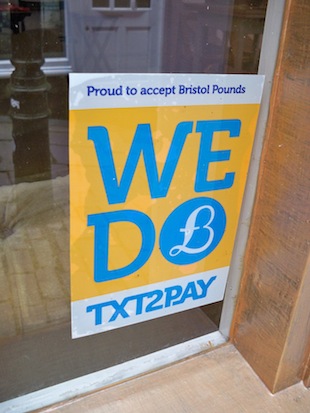[translations idioma=”ES” url=”https://archives.rgnn.org/2013/09/18/la-libra-bristoliana-apoyo-a-las-pequenas-empresas”]
BRISTOL, UNITED KINGDOM. On the 19th September, Bristol’s alternative currency, the Bristol Pound (£B) will celebrate its first birthday. It is the fifth, and most recent, complementary currency currently in operation in the UK and one of approximately twenty-three others around the world.
The purpose of a complementary currency is not to replace the national currency of the country in which operates, but to provide an alternative that keeps spending within the local economy. For example, Bristol Pounds can only be spent with independent businesses within Bristol. In turn, those businesses then spend their Bristol Pounds with local suppliers, with other independents that also accept the currency, or pay them in wages. This keeps the money in the city, as opposed to immediately leaving the local economy, which can happen with sterling when it is spent on goods and services provided by multi-national companies. The idea is that the Bristol Pound will support small businesses, strengthen the local economy and moreover, be more robust in the face of recession and other economic uncertainty.
In addition, at the currency’s inception, Bristol Pound Director and organiser, Ciaran Mundy, was also keen to emphasise the important role that independent traders play in keeping cities from the insipid homogeny now all too familiar on the UK’s high streets: “This will be money created by the people of Bristol for the Bristol people. We’ll be driving to get more money going to independent traders, to ensure we continue to keep the diversity of our city.”
A year on, the Bristol Pound is now the biggest alternative currency in the UK with around £280,000 in circulation, compared to £125,000 at its launch. Helping ensure this success is the Bristol City Council, who give Bristolians the chance to pay their Council Tax and other council services with Bristol Pounds. They also offer those that work for the council the chance to receive their wages in Bristol Pounds.
Indeed, the city’s Mayor, George Ferguson – who operates many successful businesses in Bristol, including The Bristol Beer Factory – receives his £51,000 salary in Bristol Pounds and all of his bars and other operations are fully enrolled in the scheme. Moreover, the Bristol Pound, like other alternative currencies, also allows users to make payments via their mobile phone.
The theory is certainly sound, but the big question is: does it work? Bristol Pound spokesperson, Katie Finnegan-Clarke, told the Bristol Evening Post recently: “There are about 600 businesses accepting the paper version and more are expressing an interest. When we launched a lot of shops and companies told us to come back in twelve months time. The same businesses are now coming to us, which is fantastic.” She also added how the scheme has raised Bristol’s profile around the world: “Over the last year Bristol was the second most Googled city in the country after London. It has really helped to put Bristol on the map. We are thrilled with the way things have gone over. If we had known how well were going to do when we first launched we would have been thrilled.”
The view of local businesses seems to show that trade has increased for some, whilst others are only taking a small fraction of their turnover in Bristol Pounds. Jen Best, owner of bar, Poco Tapas, has been part of the scheme since it launched. “We have seen a definite impact in our business. Some months more than others. But we do know that many of our customers come not just for great food and drink but they want to feel that the people behind the business are motivated to improve things for the whole community and promote a sustainable economy.”
Lynda Marshall, of one-woman micro-bakery, Tasty Mother’s Tucker, is fairly new to the scheme; she has only been accepting the Bristol Pound for a few months. Marshall decided to get involved because of the ethos behind the currency: “I believe in the importance of supporting independents and I believe in keeping money local, so it was natural to me to want to sign-up.” Marshall has yet to take her first payment in the Bristol Pound, but expects this to change: “Eventually I would like to be the first trader to accept only Bristol Pounds.”
The last year seems to have shown, then, that the Bristol Pound has been more successful for some businesses than others in bolstering trade, but what can’t be measured by currency – whichever currency it is – is the value of building community and strengthening and supporting independents who can often feel isolated by virtue of being a small operation. It also brings to the front page, awareness of the importance of supporting smaller businesses and not just defaulting to the supermarket, or to the chain restaurant, for example. The Bristol Pound has also gone further than any other initiative in strengthening Bristol’s reputation as an independent and creative city. Such issues are often forgotten in discussions on whether alternative currencies work, as the focus tends to be on turnover, but although none of these intangibles can be measured, they are just as powerful as hard cash.
Correction: September 20, 2013. An earlier version of this article erroneously stated that the Bristol Pound was “the only alternative currency in the UK where you can use your mobile phone to make payments.” The Brixton Pound, established five years ago, already allowed for pay-by-text technology in 2011.

